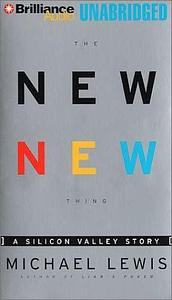Take a photo of a barcode or cover
Michael Lewis is certainly one of my favorite writers. The story I didn’t find all that enticing, yet he drew me in and it became an easy read with his prose.
Not bad, though definitely not Michael Lewis's best work.
An entertaining read, even if it is like Halt and Catch fire without the creative joy. Also a reminder that big tech didn't suddenly become shallow and craven, it was that way from the start.
A fun story about Jim Clark's role in the Internet revolution, but not Lewis' best writing.
Este libro ha envejecido, no demasiado pero da la sensación al leerlo de estar leyendo un libro de historia, todo lo contrario que con El póker del mentiroso, que sigue hoy tan vigente como entonces.
Me encanta el olfato que tiene ML para elegir los temas sobre los que escribe. elija lo que elija, hasta ahora, siempre me ha parecido el tema más interesante del mundo.
En esta ocasión asistimos a la creación, ascenso y pinchazo de la burbuja de las puntocom desde primera fila, siguiendo la historia de Jim Clark, un emprendedor en toda regla que se forró secuencialmente con Sillicon Graphics, Netscape y Healtheon. Clark es un individuo curioso, con una ansia interminable por hacer cosas nuevas, que triunfó varias veces debido principalmente a la gran capacidad de convicción que tenía sobre inversores y colaboradores. Un personaje curioso. ML dedica un montón de páginas al Hyperion, el yate de Clark, que funciona en automático guiado por 25 ordenadores. La obsesión de Clark por su yate contribuye a que lo veamos como un bicho raro, efecto totalmente buscado por el autor.
En resumen, el libro es bueno, está muy bien escrito, y el tema es interesante. Recomendable.
Me encanta el olfato que tiene ML para elegir los temas sobre los que escribe. elija lo que elija, hasta ahora, siempre me ha parecido el tema más interesante del mundo.
En esta ocasión asistimos a la creación, ascenso y pinchazo de la burbuja de las puntocom desde primera fila, siguiendo la historia de Jim Clark, un emprendedor en toda regla que se forró secuencialmente con Sillicon Graphics, Netscape y Healtheon. Clark es un individuo curioso, con una ansia interminable por hacer cosas nuevas, que triunfó varias veces debido principalmente a la gran capacidad de convicción que tenía sobre inversores y colaboradores. Un personaje curioso. ML dedica un montón de páginas al Hyperion, el yate de Clark, que funciona en automático guiado por 25 ordenadores. La obsesión de Clark por su yate contribuye a que lo veamos como un bicho raro, efecto totalmente buscado por el autor.
En resumen, el libro es bueno, está muy bien escrito, y el tema es interesante. Recomendable.
The story is just another saga of the same old rich tech billionaires being shits. It’s a long “isn’t he interesting” piece about a guy who repeatedly managed to hack the stock market to enrich himself. Of interest to others, I’m quite sure, so if it sounds like your bag, I would say go for it.
That is, I *would* say go for it, if the text itself wasn’t pretty consistently indulging in horrific stereotyping of Indian software developers. There’s gratuitous talk of rooms “smelling like curry”, which felt pejorative. Lots of discussion about there being “no US citizen in the room”. In the audiobook I read, the narrator imitates Indian accents when quoting. (There’s also god awful UK and New Zealand accents). I am absolutely not interested in hearing the “it’s of it’s time” take.
Don’t buy this book.
That is, I *would* say go for it, if the text itself wasn’t pretty consistently indulging in horrific stereotyping of Indian software developers. There’s gratuitous talk of rooms “smelling like curry”, which felt pejorative. Lots of discussion about there being “no US citizen in the room”. In the audiobook I read, the narrator imitates Indian accents when quoting. (There’s also god awful UK and New Zealand accents). I am absolutely not interested in hearing the “it’s of it’s time” take.
Don’t buy this book.
Re-read this for "reasons". Some interesting insights into Clark's character as well as the pervasive attitude in Silicon Valley during this time period. Some would say the amount of hot air being blown is comparable to today's tech climate, but I would argue that the current optimism is more grounded in reality. Lewis gets distracted by parts of the story that don't matter (automated sailboats) and some of the people I most want to hear from (on the ground engineers not making millions of dollars) get little page time.
adventurous
informative
fast-paced
I feel like this isn't as timeless a story as Lewis had hoped it would be. It's nice if you know some shit about the 90s/00s. But I don't! What the fuck is Netscape? Still, a testament to Lewis that I read the whole fricken thing!
This book focuses a lot on Clark’s boat, and while interesting enough, I found myself wondering, “who cares?” Ultimately this book covers a subject which is wildly out of date nowadays. All of Clark’s companies pretty much went defunct or didn’t have nearly as big of an impact as he claimed they would. I kept waiting for the hammer to fall and all of these big things to flop but the book doesn’t reach that far. It would be interesting if Lewis updated it perhaps.
Clark got himself pretty rich and certainly had an impact but I’m not sure if this book is warranted.
Clark got himself pretty rich and certainly had an impact but I’m not sure if this book is warranted.




